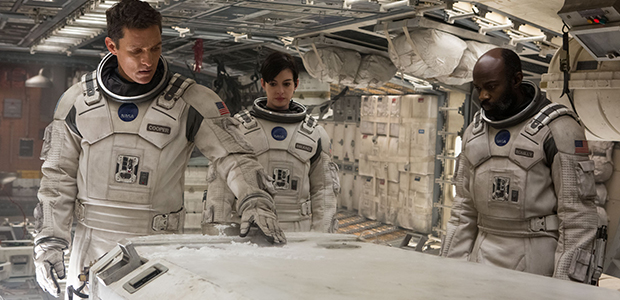
There is so much to admire about Interstellar that I’m almost not sure what to make of its last act, where its ambitiousness gets the better of it and turns an otherwise perfectly plausible, perfectly admirable film experience into a puzzling, almost baffling metaphysical jaunt that you struggle to keep up with even while it’s unfolding.
In much the same way that director Christopher Nolan turned the cerebral, seemingly difficult to comprehend notions of dreams into the setup of an original film in Inception, here he uses the theory behind black holes and space travel to create what is at once one of the most engaging films of the year. Because this is a Nolan film, you don’t just watch, you participate, with your mind and your thoughts racing to keep up, deciphering, unraveling everything that’s happening. Interstellar remains true to this Nolan maxim even as the story shifts from the Cooper family farm, where we are introduced to Matthew McConaughey’s astronaut turned farmer, to the expanse of outer space, where he pilots himself and a small crew to try and discover other habitable planets in distant galaxies using wormholes to travel unfathomable distances.
Portions of Interstellar work indescribably well. The space-time continuum is explored in detail, with the facts of the science behind this difficult to understand concept merged with believable fiction to create heady scenes that baffle your imagination. If you ever studied Physics at university and found the theories related to three (or four or five) dimensions interesting, the movie will have you wheezing at how wondrously, absolutely awe-inspiringly it uses this and relativity to amaze us. Yes amaze – when was the last time a film did that to you while watching it? And while it can be argued that the use of these concepts isn’t exactly original (if you ever watched a single season of Star Trek TNG, they were probably explored or applied at least once) its how the Nolan brother’s script puts it to use for the service of their story that must be commended.
Then we see the bizarre final act. I’m not sure what to make of it. On some level it makes sense. On another, maybe it’s not supposed to. In a film about feelings and emotional bonds, especially related to familial and parental love, the science gets muddled by some rather abstract inter-dimensional play with time, space, the physical universe and our entire understanding of these very things. In true Nolan fashion, everything seems to end up neatly but still leaving you with the desire to see it again so you can be completely sure about what you’ve experienced.
You have to admire the audaciousness of it all though. Despite its flaws, including some visual effects that look rough and uncharacteristically unpolished and even muffled sound editing, Interstellar feels like its light years ahead of anything else. The scale of everything, including what we see on some of the planets, is so grand in design, so precise in execution, so daringly bold that you have to appreciate the thought that must have gone into conceiving it. The film may (or may not) one day be regarded as a watershed moment not just for the sci-fi genre, but also as part of the director’s repertoire. Time, always a funny thing, will tell. For now know that even though Interstellar feels imperfect, it is imperfectly brilliant.
Rating: 



